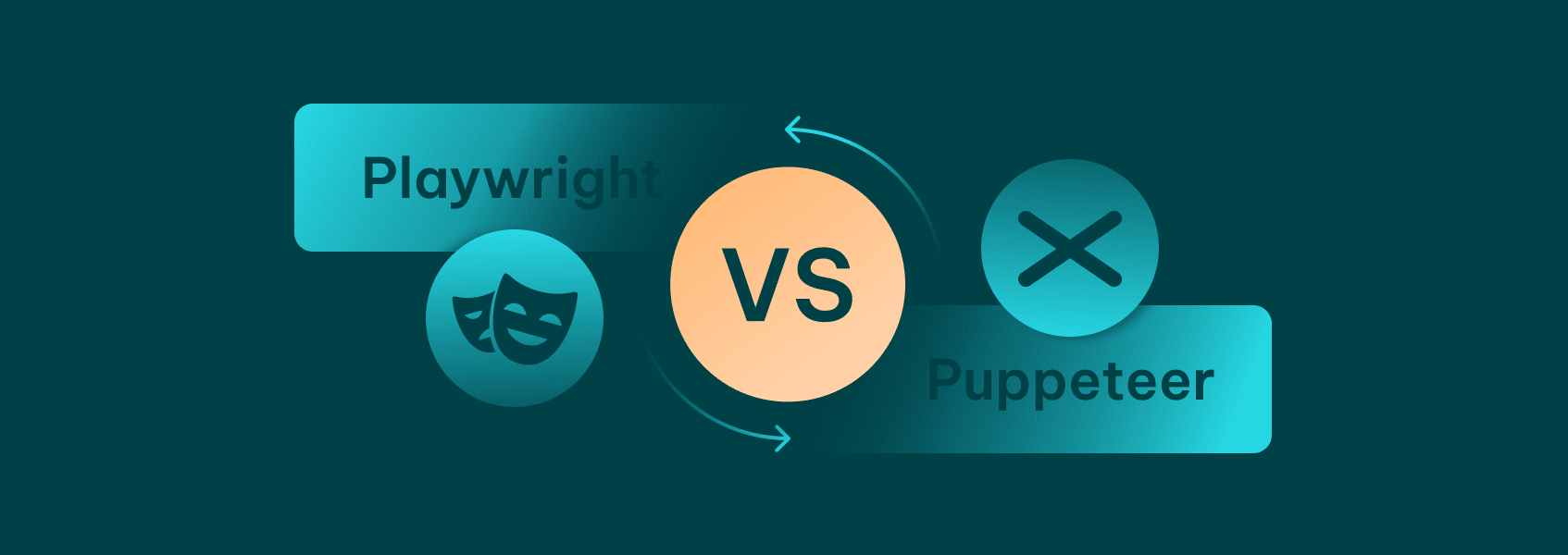Playwright vs. Puppeteer: Which One to Pick?
Software comparisons

Justas Vitaitis
Both Playwright and Puppeteer are popular web scraping libraries used by developers. While they’re intended for automating web browsers, most of the features are perfect for web scraping as well.
While you can use both simultaneously, many developers opt for one over the other. As such, there’s a long-standing discussion about Playwright vs Puppeteer . We’ll go through the benefits and advantages of both and outline the best use cases for each one.
What Is Playwright?
Playwright is a browser automation library created in 2020 to provide cross-browser support. It provides a single API for most browser engines, such as Firefox, WebKit, and Chromium. Since most browsers run on one of those engines, you can automate most things with it.
Additionally, the Playwright framework provides various other features, such as headless browsers, cross-platform support, and automation for native mobile apps (e.g., Android and iOS browsers). It also supports multiple programming languages.
So, the library is great for a few things:
- End-to-end testing
Since you can run multiple browser types and even native mobile app testing, it’s a great library for covering everything at once.
- Web scraping
Playwright provides full web automation features, allowing you to extract data with ease, even from complicated websites.
- Other browser automation tasks
The framework is perfect for tasks such as downloading PDFs, filling out forms, etc.
What Is Puppeteer?
Puppeteer is also a web automation library widely used for web scraping tasks. Like Playwright, it’s been built by a major company – Google. Due to the relation, most of the features are intended to work with Chromium, although newer versions also work with Firefox.
Capabilities are a bit more limited in Puppeteer. Not only does it work with fewer browsers, but also supports fewer programming languages. It’s intended to run on various JavaScript runtime environments and frameworks.
Yet, Puppeteer remains popular as it still has numerous amazing benefits:
- Web scraping tasks
Puppeteer is perfect for data extraction, even from complicated, JavaScript-laden web pages.
- Headless testing
The Puppeteer framework runs headless by default and is greatly tailored towards such use cases, making testing effective and quick.
- Automation
Just like Playwright, Puppeteer provides a long-list of capabilities that automate web tasks such as filling out forms, taking screenshots, etc., easier.
Playwright vs. Puppeteer: The Difference
Features
Playwright
Playwright provides full cross-platform, cross-language, and cross-browser testing support with capabilities for multiple operating systems, making it perfect for evaluating a wide array of conditions and possibilities. As such, it’s the better testing framework overall, as it’s capable of running multiple tests under one roof.
Additionally, Playwright provides both synchronous and asynchronous support for web scraping and testing capabilities. So, it works great both for smaller and larger projects. You also get full proxy support with Playwright , which makes it even better for scraping.
You can also use various network-based features as Playwright supports mocking. It’ll allow you to intercept, modify, and change various aspects of network and HTTP requests.
Finally, a key feature of Playwright is the auto-wait functionality, which lets developers better simulate real users. It can be set after various actions, while Puppeteer lacks a direct comparison. Although it does have various wait functions available, each has to be set separately.
Puppeteer
Puppeteer primarily supports Chromium-based browsers, although experimental Firefox and Edge features are available. It’s also limited to JavaScript-based frameworks and environments.
On the other hand, Puppeteer has incredible community support and extensive documentation, which makes the learning curve a lot better.
While you can’t run synchronous network requests, Puppeteer is highly efficient at asynchronous requests, so it’s great for large web scraping projects.
Finally, if you like Puppeteer, there are plenty of unofficial libraries for other programming languages, such as Pyppeteer for Python.
Performance
Both frameworks are highly optimized and efficient for both testing and web scraping tasks. Playwright, however, may be less efficient due to the multiple language and browser support while Puppeteer is more streamlined towards Chromium, even if the differences may be marginal.
Limitations
Playwright has two major limitations:
- Less extensive documentation and community support
- A steeper learning curve due to the multitude of features and supported browsers.
As such, Playwright is initially harder to learn and may be more difficult to get the hang of for less experienced users. However, once the knowledge is there, Playwright is overall the more powerful framework.
On the other hand, Puppeteer’s limitations are largely due to the limited browser type and programming language support. It’s easier to learn due to fewer features and an incredible community, but it may be less effective if both are compared on their capabilities.
Is Playwright Good for Web Scraping?
Playwright is great at both web scraping and browser automation. It’s still greatly optimized for various data extraction tasks and the multiple browser automation features make it great for niche use cases.
Additionally, many of the features used for browser automation can be readily reused for scraping, so Playwright is definitely a great option.
When compared to Puppeteer, Playwright is just as good in nearly all cases and, in some, it’s even better as some websites behave differently with different browsers. So, in niche cases, Playwright may be able to get more data than Puppeteer.
Is Playwright Worth Learning?
Playwright is definitely worth the time investment, whether you intend to use it for browser automation, testing, or web scraping. While the learning curve is a little steeper, it’s far more modular and capable than Puppeteer.
Additionally, support for multiple programming languages makes Playwright more accessible to various projects. Puppeteer does have unofficial support, but it relies on third parties for maintenance , making it a little more complicated.
Conclusion
Both Playwright and Puppeteer are great frameworks for web scraping and browser automation. The former is better at cross-browser support, as you can run nearly any type on the framework. Puppeteer has little to no cross-browser support as it’s focused on Chromium with some features for Edge and Firefox.
If you intend to only work with Chromium and have no need for cross-browser support, Puppeteer is a great option as it’ll be easier to learn and just as effective. However, once you delve into cross-browser support requirements, Playwright is the better option. If you don’t care much about the learning curve, then Playwright is also the better choice.

